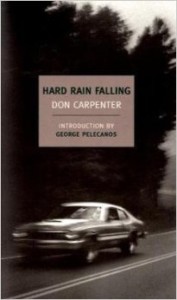Grit and Squalor
 Carpenter, Don (1966/2009). Hard Rain Falling. New York: New York Review Books
Carpenter, Don (1966/2009). Hard Rain Falling. New York: New York Review Books
Gritty is too mild a descriptor for this unrelentingly dark character study of a young man in Portland and San Francisco in the 1960’s. Jack is a loser from the start, the product of a harsh orphanage. When we meet him at 17, he is a violent, depressed street tough, drifting through pool halls, drinking, smoking, screwing underage girls, and committing petty crime to make his living. No surprise, he ends up in prison, where we watch him adapt to violent prison life and become romantically involved with another inmate. After his release, he marries a rich, hypersexual alcoholic woman and has a child. In the end, we can guess that the child’s fate will be a replay. There is no uplifting redemption.
The writing is “muscular,” meaning action-oriented, precise, concise, and vivid. At the same time, all characters also have well-rendered interior lives. Jack especially tends to introspective, even philosophical episodes of brooding that prevent him from being one-dimensional. Sometimes these episodes seem inconsistent with his low-reactive, violent and depressed temperament, however.
Another, more subtle problem, is that while Jack is presented as a sympathetic character who can’t get a break in a cold, uncaring world, his thoughts and behavior show him to be merely lazy and selfish, an intelligent, thoughtful person who refuses to take responsibility for his life. He’s not a tragic victim of fate. Is he excused from the chores of living because he was raised in an orphanage? I saw that inconsistency as a flaw in the rendering of his character.
Nevertheless, the carefully drawn characters make this a literary novel, though its moody urban settings, lowlife cast, and violent action give it plenty of genre credentials. The story line is a biography, just shy of an actual plot, but events do unfold causally, so it’s not merely a picaresque. It’s a nice hybrid.
The book was out of print for decades and has only recently been republished. It’s possible it did not do well on its first outing because of its hybrid status – what audience would read it? Also, the matter-of-fact account of Jack’s homosexual affair in prison might have been too much for mid-century readers. Whatever the reasons for its earlier neglect, it’s back now and should be read.
Samples of the writing:
[In prison,] he could hear other boys being brought in, yelling, cursing, some of them crying… Maybe in the cells they would learn the truth as he had, and know that nothing existed but a single spark of energy, and that spark could die for no reason, and existed for no reason. They would understand that it does no good to cry out, because a spark of energy has no ears; the ears are a lie, a joke, a dream, to keep the spark going, and there is no reason to keep the spark going. (p 83)
Years before [Billy] had said and meant, “Fuck the niggers” – he had seen too many of his friends swallowed up in bitterness, and he wanted to escape, not drown. But now he was in the awful position of seeing his children grow toward that moment when they would know, would be shown, told, that they were niggers and not human beings. (p. 187)
She took him to a production of Waiting for Godot, perhaps rather cattishly hoping it would snow him and make him feel inadequate; but when they left the theater and she began talking about Beckett’s use of language, Jack interrupted her and said, “Hell, it seems simple enough to me. They’re waiting, that’s all. It don’t matter what for.”
…It’s not that simple,” she said, but she was not sure why it was not that simple. (p. 261)
“You can’t take care of Billy and stay out all night, too. Forget about me. Think about him.”
…”Why should I?”
Jack gritted his teeth. “Because you’re his mother!”
“You think I don’t know it? What the fuck do you know about it? Have you ever had to sit in a place like this and know you couldn’t do a goddam thing because you had this infant around your neck? That’s what it’s like, you know. The baby is hanging around your neck and you can’t kill it and you can’t leave it and it gets so goddam boring sometimes I want to die and you don’t know fuck-all about it…” (p. 297)
These are characters you don’t forget.
